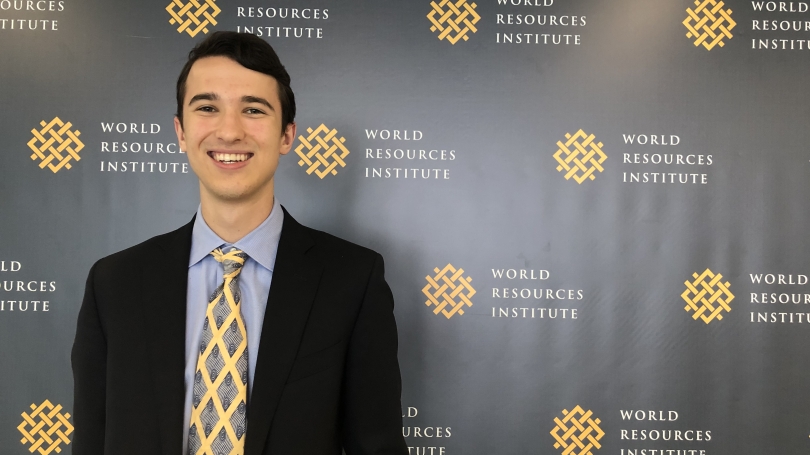
- Public Policy
- Leadership
- Funding
- News & Events
- About the Center
Back to Top Nav
Back to Top Nav
Back to Top Nav
Back to Top Nav
Mark Parrino '22 interned at the Climate Institute in Washington D.C. during the 2019 summer term.
This summer, I spent 10 weeks working at the Climate Institute in downtown Washington D.C. Founded by John Topping (Dartmouth ’64) in 1986, the Climate Institute is the country’s first organization focused solely on climate change. The Institute works on mitigating the effects of climate change by raising international awareness and advancing and sharing research. My primary work at the Climate Institute involved writing a research paper about the current state of climate change in the Arctic regions and what techniques are being researched to combat that change. My paper is organized into three sections: 1) The current status of the Arctic with regard to climate change. 2) The local and global impacts of Arctic change. 3) Out-of-the-box solutions to mitigating climate change in the Arctic. The paper will soon be published on the Climate Institute website.
When I was not working on my research paper, I attended congressional briefings on Capitol Hill, panels hosted by other NGOs, and other climate related events in the D.C. area. My supervisors would usually assign me to go to certain events that they did not have time to attend, and I would write a report or have a meeting with them upon returning to the office. Sometimes, the report would be published on the Climate Institute website to increase exposure to that particular issue, while other times, I would simply email my findings to my supervisors.
Additionally, an amazing aspect of my internship was the close contact I enjoyed with well-accomplished scientists and thinkers in the environmental field. I enjoyed many substantial conversations with these mentors about a vast range of environmental issues. Dr. Michael MacCracken, a brilliant climate scientist and contributor to the IPCC report on climate change, visited the office several times throughout the summer, one time spending over three hours to share his knowledge with me and my fellow interns about the current state of the climate crisis and his list of important actions the U.S. and the world need to take to avoid serious danger in the future. The first item on his list is electrification of transportation, which would require modernizing the electrical grid nationwide – one of the main projects currently pursued by the Climate Institute.
This summer has given me a window into both the science and policy sides of how changes occur. Learning from top-notch scientists, listening to members of congress sponsor scientific briefings, and writing about everything I discovered, I gained valuable skills and new understandings of the political process and policy advocates that are relevant in numerous fields both in school and after graduating. Thus, through my time at the Climate Institute, I have reinforced old skills and learned new ones. I learned to act professionally – to show up on time, well-dressed, and to act properly in an office setting. I learned to keep a tight schedule and to get written documents in on time. I learned how to interact with people that are far senior to me. Finally, I learned to have hope for the future. Although at times it seems as though the future is bleak, I know there are many superbly talented people that have been working on climate change and other similar issues for decades. With belief, perseverance, and a willingness to change, I am hopeful for the future of the planet. I would like to thank the people at the Rockefeller Center and the Class 1971 for sponsoring my internship. It was an unforgettable experience.
The Rockefeller Internships Program has funding for Dartmouth undergraduate students to help defray the cost of living expenses associated with a full-time, unpaid, leave-term internships in the fields of public policy, public affairs, and social entrepreneurship.